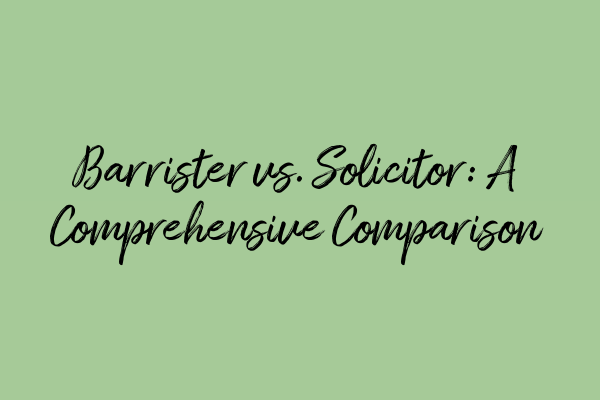Barrister vs. Solicitor: A Comprehensive Comparison
When it comes to legal matters, having the right professional by your side can make all the difference. Whether you’re facing criminal charges or need assistance with a legal matter, understanding the differences between barristers and solicitors is crucial. In this article, we will provide a comprehensive comparison of barristers and solicitors, helping you determine which legal professional best suits your needs.
1. Roles and Responsibilities
Barristers and solicitors have distinct roles and responsibilities within the legal system.
A barrister is a specialist legal advocate who focuses on courtroom representation. They typically provide expert legal advice, prepare cases, and advocate for clients in court. Barristers are often instructed by solicitors to represent clients in complex or high-profile cases.
A solicitor, on the other hand, is a legal professional who handles a wide range of legal matters. They provide legal advice, draft legal documents, negotiate settlements, and represent clients in various legal proceedings. Solicitors are usually the first point of contact for individuals seeking legal assistance.
2. Expertise and Training
Becoming a barrister or solicitor requires years of rigorous training and education.
To qualify as a barrister, individuals must complete a law degree, followed by the Bar Professional Training Course (BPTC). After completing the BPTC, aspiring barristers must secure pupillage, a practical training period under the guidance of an experienced barrister. Pupillage typically lasts for one year and involves shadowing and assisting a barrister in their work.
Solicitors, on the other hand, must complete a law degree, followed by the Legal Practice Course (LPC). After the LPC, aspiring solicitors must secure a two-year training contract with a law firm or other legal entity. During the training contract, solicitors gain practical experience in various areas of law, which helps them develop a broader knowledge base.
3. Courtroom Representation
One of the key distinctions between barristers and solicitors is their roles in courtroom representation.
Barristers primarily specialize in courtroom advocacy and are usually responsible for presenting cases and cross-examining witnesses in court. They have extensive experience in oral argumentation and are skilled at persuading judges and juries. Solicitors, on the other hand, primarily focus on preparing cases for trial and instructing barristers on behalf of their clients.
4. Client Interaction
Solicitors typically have more direct client interaction compared to barristers.
As the first point of contact for clients, solicitors build relationships, gather information, and provide legal advice tailored to each client’s circumstances. They guide clients through the legal process and ensure their rights are protected. Barristers, on the other hand, often work behind the scenes and interact with clients through solicitors, primarily during court proceedings.
5. Areas of Practice
Barristers and solicitors also differ in the areas of law they specialize in.
Barristers often specialize in specific areas of law, such as criminal law, family law, or commercial law. They develop in-depth knowledge and expertise in their chosen field, making them highly sought after for complex cases within their specialization.
Solicitors, on the other hand, have a broader scope of practice and handle a wide range of legal matters. They may advise clients on various issues, including family law, employment law, corporate law, property law, and more. Solicitors can provide comprehensive legal support across different areas.
Conclusion
In summary, barristers and solicitors play distinct roles within the legal system. Barristers specialize in courtroom advocacy and are typically instructed by solicitors to represent clients in court. Solicitors have a broader scope of practice and handle various legal matters outside the courtroom.
When choosing between a barrister and solicitor, consider the nature of your legal matter and your specific needs. For complex or high-profile cases requiring courtroom representation, consulting a barrister is often recommended. For more general legal matters, solicitors can provide comprehensive support and guidance.
For further reading on related topics, we recommend the following articles:
- Private Prosecutions: Exploring Non-Governmental Prosecutions in Criminal Cases
- Ethical Challenges in Criminal Defence: Navigating Dilemmas
- Understanding Drug-related Offences: Laws and Penalties in the UK
- Magistrates’ Court vs Crown Court: Different Paths in Criminal Proceedings
- Criminal Defence Strategies: Expert Approaches to Protecting Clients’ Interests


Leave a Reply